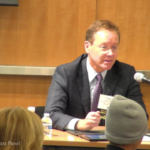Panelists discuss transparency issues related to sexual harassment reporting, voting machines, schools and hospitals as the Georgia Legislature opens.

(L-R) Tom Clyde, James Salzer, Cobb Commissioner Lisa Cupid, Marissa Dodson, Sen. Jennifer Jordan and Cynthia Counts.
A panel of elected officials, First Amendment lawyers and a seasoned Gold Dome journalist weighed in on potential transparency threats emerging in the 2019 General Assembly session during the Georgia First Amendment Foundation’s annual Legislative Breakfast on Jan. 24.
On the agenda: New rules for filing sexual harassment complaints against lawmakers. Big changes to Georgia’s voting system and a potential $150 million price tag. Eroding access to public school operations and performance. And a move to add visibility to the business operations of many hospitals.
The lively discussion took place at the Georgia State University College of Law. Co-sponsors of the event were the GSU chapters of the National Lawyers Guild, the Black Law Student Association and the Latinx & Caribbean Law Student Association. First Amendment attorney and GFAF board member Cynthia Counts moderated the discussion.
If you missed it, we’ve got you covered with a video of the event. Highlights include:
- State Sen. Jennifer Jordan laments the proposed new sexual harassment policy lawmakers unveiled as the 2019 session started (start at the 2:38 mark).
- Cobb County Commissioner Lisa Cupid, a GFAF board member, says the City of Atlanta’s transparency problems were an eye-opener for other local governments and describes how agencies should respond to open records requests from citizens (6:32).
- The Atlanta Journal-Constitution’s longtime statehouse journalist James Salzer wants the Legislature to abide by the same transparency laws that lawmakers have placed on local governments (9:25).
- Marissa Dodson, public policy director of the Southern Center for Human Rights, talks about the role of statewide Accountability Courts and data available to the public to measure their success (16:42).
- First Amendment attorney and GFAF board member Tom Clyde weighs in emerging open

Tom Clyde
government issues, including the loss of transparency in school testing and possible added insight into the business operations of many of Georgia’s hospitals (22:25). He also lays out what Georgians don’t know about the proposed changes to voting processes and new voting machines (46:40).
The full video also provides a lively debate about the role of police body cameras and a more detailed conversation about Georgia’s shift to new voting machines and processes.
